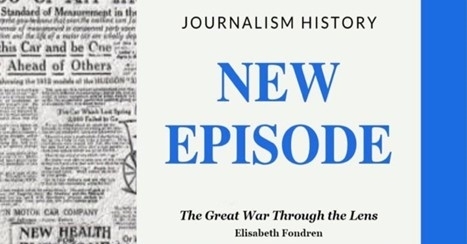
Elisabeth Fondren, Ph.D., Assistant Professor of Journalism, Division of Mass Communication, The Lesley H. and William L. Collins College of Professional Studies, was recently interviewed for the 74th episode of the Journalism History podcast by host Teri Finneman, Ph.D.
Dr. Fondren discussed her recently published journal article about the unknown World War I photographer Percy Brown, who captured significant photojournalism history during 1914–20 along the Western Front. Mr. Brown continued to take pictures during his time in captivity in a German prison camp after he was accused of being a spy.
“Pictures matter, but also so do the stories that describe how these pictures were created and who was behind the camera,” said Dr. Fondren.
Dr. Fondren is the author of “‘The Mirror with a Memory’: The Great War through the Lens of Percy Brown, British Correspondent and Photojournalist (1914-1920),” which was published in the March 2021 issue of Journalism History, the oldest peer-reviewed journal of mass media history in the United States.
As an unaccredited freelancer, with a working-class background in carpentry and figure skating, Mr. Brown did not have the credibility of a renowned photojournalist. However, through his ingenuity, grit, and sheer “war luck,” he was able to access battlefields, ports, and cities along the Western Front to provide an eyewitness account of the 21st century’s mass-mediated war.
Mr. Brown’s story—and his original wartime images—also draw attention to the larger themes of how war correspondents source information, produce news, and negotiate pressures from authorities. In the Fall of 1915, Mr. Brown was arrested by German police, who accused him of being a spy, and held him in the Ruhleben internment camp for the next three years. After the Armistice, Mr. Brown continued to report from Berlin and covered the Paris Peace Conference in 1919–20.
The podcast also covers press censorship during the Great War and the dysfunctional relationship between the military and the press. In the interest of protecting national security and shaping the wartime narrative, the British military restricted access to news and information in battle zones, which is why Mr. Brown’s untold story and photos add to historians’ understanding of the conflict.
“Mr. Brown’s story offers an insider’s view to wartime reporting during World War I through a rare perspective and demonstrates why photojournalism history matters,” said Dr. Finneman.
Journalism History, hosted by three professional media historians and available in 96 countries, reexamines the stories you thought you knew and the ones you were never told. Click here to listen to the full podcast interview. Transcripts are available at https://journalism-history.org/podcast/.
Related News
Founder’s Week Celebration Lights Hearts on Fire at St. John’s
St. Vincent de Paul was a practical man of action. He was a master at building teams composed of the most talented people suited to his cause. His passion motivated others; he set hearts on fire.
New Academic Year Celebrated by Honoring and Welcoming Faculty
On the eve of each new academic year—before the bustle that naturally comes with new and returning students—St. John’s University always takes a moment to pause and reflect on the critical contributions made by its faculty, honoring their service and welcoming its newest members.
St. John’s Embraces the AI Frontier: Preparing Students for a Human-Centered Future
At St. John’s University, artificial intelligence (AI) isn’t just a trending topic—it’s fast becoming an integral part of how students learn, create, and prepare for the world ahead.
